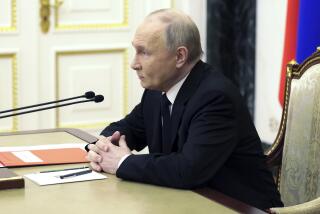Yeltsin Opposes Gorbachev’s Plan, Has His Own Draft Treaty, Aide Says : Soviet Union: The Russian president reportedly feels there is a need to reduce the central bureaucracy.
- Share via
MOSCOW — Russian Federation President Boris N. Yeltsin, angered by what he sees as an attempt by the Soviet government to preserve its powers over the independence-minded republics, will oppose the draft treaty that establishes the constitutional basis for a new state, his deputy prime minister said Tuesday.
Instead, Yeltsin will propose his own plan, concentrating power in the republic governments--and, effectively, putting his Russian Federation, as the largest and richest republic, in control of the whole country.
Gennady E. Burbulis, Russia’s first deputy prime minister, said the Russian leader objected strongly to the treaty proposed by Soviet President Mikhail S. Gorbachev on Monday when Yeltsin found new elements in the draft and violations by the central government of previous agreements to reduce its bureaucracy.
Yeltsin, challenging Gorbachev at the meeting Monday of seven republic leaders, had “insisted that it is impermissible to solve the crucial problems of transforming the state structures of the former (Soviet) Union in the fashion it is being (done) now,” Burbulis told Russian legislators.
Although Burbulis provided no details of Yeltsin’s constitutional plan, saying only that he had worked out his own draft for the Union Treaty, the Russian leader had sought greater powers for his republic during the sharp debate on Monday. From the changes to the accord published on Tuesday, he appeared to have won concessions on several important points.
Among Yeltsin’s gains:
* An effective veto for Russia in the Council of the Republics, one of the two houses of the new legislature. Each republic will be able to request voting by consensus.
* The clear right for a republic to revoke national legislation on its territory.
* A veto over republics that join the new union later.
* And a vice president who cannot succeed an incapacitated president, a move intended to foil another coup attempt and to bar the country’s top post to a Central Asian vice president.
But what Yeltsin wanted, and failed to get, was a true philosophical reorientation of the treaty, making clear the paramount standing of the republics within the new union and casting the central government in the role of a coordinator among them.
Yeltsin, meeting Tuesday with the provincial representatives he has appointed to implement his policies across the country, declared his intent to proceed at an accelerated pace in transforming the economy by radical reforms.
With control of roughly two-thirds of Soviet industry, agriculture and finance, the Russian Federation can act while the central government remains paralyzed, Yeltsin argued, and the economic changes will speed the process of political change.
Yeltsin’s moves drew a warning Tuesday from Ukrainian leader Leonid Kravchuk, who said Yeltsin is simply turning the Russian Federation into a new central government and thereby undermining his declared goal of having sovereign republics free to follow their own course.
“Boris Yeltsin believes that Russia should remain the center around which the newly independent states will revolve,” Kravchuk commented. Moscow would undoubtedly be a “center,” he acknowledged at a press conference in Kiev, the Ukrainian capital, “and we will deal with it like a state deals with any center--say, with Paris.”
The Ukraine has refused so far to participate in drafting a revised Union Treaty, and Kravchuk said he regards the effort as a “deception” in which he wants no part. “There are no guarantees whatsoever against the center seizing power again,” Kravchuk said, referring to the August putsch here.
But without the Ukraine, the proposed Union of Sovereign States would essentially unite Russia and neighboring Belarus with five poor and largely Muslim republics in Central Asia, and Yeltsin’s present maneuvers reflect in part Russians’ mounting concern about the character and the cost to them of the new state.
Although the draft treaty was to have been initialed by the republic leaders and Gorbachev on Monday, Yeltsin’s strong objections and the heated debate that followed brought a decision to send the draft to the parliaments of the country’s remaining 12 republics and the national legislature for debate.
That move is certain to delay the treaty’s adoption and could lead to a new draft to incorporate the ideas of the lawmakers or even to an abandonment of the effort through sheer frustration.
“Finally, we have to admit: Today, no plan for a political union can cope with the powerful centrifugal forces,” the liberal newspaper Komsomolskaya Pravda commented on Tuesday. “In combination with the economic crisis, it is even more dangerous. . . . It is not the differences between the republics that are the stumbling block. The point is that the republics don’t even want to negotiate.”
For Gorbachev, as other Soviet political commentators noted, the setback was a serious political defeat.
Michael Parks is chief of The Times’ Moscow Bureau; Viktor K. Grebenshikov is a reporter in the Moscow Bureau.
More to Read
Sign up for Essential California
The most important California stories and recommendations in your inbox every morning.
You may occasionally receive promotional content from the Los Angeles Times.










